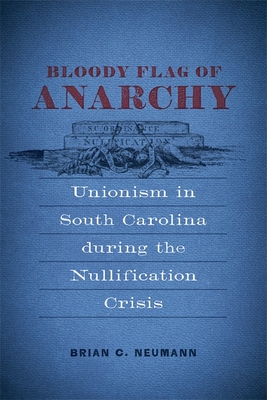Bloody Flag of Anarchy: Unionism in South Carolina During the Nullification Crisis

Bloody Flag of Anarchy: Unionism in South Carolina During the Nullification Crisis
Generations of scholars have debated why the Union collapsed and descended into civil war in the spring of 1861. Turning this question on its head, Brian C. Neumann's Bloody Flag of Anarchy asks how the fragile Union held together for so long. This fascinating study grapples with this dilemma by reexamining the nullification crisis, one of the greatest political debates of the antebellum era, when the country came perilously close to armed conflict in the winter of 1832-33 after South Carolina declared two tariffs null and void. Enraged by rising taxes and the specter of emancipation, 25,000 South Carolinians volunteered to defend the state against the perceived tyranny of the federal government. Although these radical Nullifiers claimed to speak for all Carolinians, the impasse left the Palmetto State bitterly divided. Forty percent of the state's voters opposed nullification, and roughly 9,000 men volunteered to fight against their fellow South Carolinians to hold the Union together. Bloody Flag of Anarchy examines the hopes, fears, and ideals of these Union men, who viewed the nation as the last hope of liberty in a world dominated by despotism--a bold yet fragile testament to humanity's capacity for self-government. They believed that the Union should preserve both liberty and slavery, ensuring peace, property, and prosperity for all white men. Nullification, they feared, would provoke social and political chaos, shattering the Union, destroying the social order, and inciting an apocalyptic racial war. By reframing the nullification crisis, Neumann provides fresh insight into the internal divisions within South Carolina, illuminating a facet of the conflict that has long gone underappreciated. He reveals what the Union meant to Americans in the Jacksonian era and explores the ways both factions deployed conceptions of manhood to mobilize supporters. Nullifiers attacked their opponents as timid "submission men" too cowardly to defend their freedom. Many Unionists pushed back by insisting that "true men" respected the law and shielded their families from the horrors of disunion. Viewing the nullification crisis against the backdrop of global events, they feared that America might fail when the world, witnessing turmoil across Europe and the Caribbean, needed its example the most. By closely examining how the nation avoided a ruinous civil war in the early 1830s, Bloody Flag of Anarchy sheds new light on why America failed three decades later to avoid
Descrierea produsului
Generations of scholars have debated why the Union collapsed and descended into civil war in the spring of 1861. Turning this question on its head, Brian C. Neumann's Bloody Flag of Anarchy asks how the fragile Union held together for so long. This fascinating study grapples with this dilemma by reexamining the nullification crisis, one of the greatest political debates of the antebellum era, when the country came perilously close to armed conflict in the winter of 1832-33 after South Carolina declared two tariffs null and void. Enraged by rising taxes and the specter of emancipation, 25,000 South Carolinians volunteered to defend the state against the perceived tyranny of the federal government. Although these radical Nullifiers claimed to speak for all Carolinians, the impasse left the Palmetto State bitterly divided. Forty percent of the state's voters opposed nullification, and roughly 9,000 men volunteered to fight against their fellow South Carolinians to hold the Union together. Bloody Flag of Anarchy examines the hopes, fears, and ideals of these Union men, who viewed the nation as the last hope of liberty in a world dominated by despotism--a bold yet fragile testament to humanity's capacity for self-government. They believed that the Union should preserve both liberty and slavery, ensuring peace, property, and prosperity for all white men. Nullification, they feared, would provoke social and political chaos, shattering the Union, destroying the social order, and inciting an apocalyptic racial war. By reframing the nullification crisis, Neumann provides fresh insight into the internal divisions within South Carolina, illuminating a facet of the conflict that has long gone underappreciated. He reveals what the Union meant to Americans in the Jacksonian era and explores the ways both factions deployed conceptions of manhood to mobilize supporters. Nullifiers attacked their opponents as timid "submission men" too cowardly to defend their freedom. Many Unionists pushed back by insisting that "true men" respected the law and shielded their families from the horrors of disunion. Viewing the nullification crisis against the backdrop of global events, they feared that America might fail when the world, witnessing turmoil across Europe and the Caribbean, needed its example the most. By closely examining how the nation avoided a ruinous civil war in the early 1830s, Bloody Flag of Anarchy sheds new light on why America failed three decades later to avoid
Detaliile produsului












